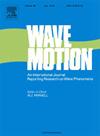We study the propagation of high-frequency electromagnetic waves in randomly heterogeneous bianisotropic media with dissipative properties. For that purpose we consider randomly fluctuating optical responses of such media with correlation lengths comparable to the typical wavelength of the waves. Although the fluctuations are weak, they induce multiple scattering over long propagation times and/or distances such that the waves end up traveling in many different directions with mixed polarizations. We derive the dispersion and evolution properties of the Wigner measure of the electromagnetic fields, which describes their angularly-resolved energy density in this propagation regime. The analysis starts from Maxwell’s equations with general constitutive equations. We first ignore the random fluctuations of the optical response and obtain uncoupled transport equations for the components of the Wigner measure on the different propagation modes (polarizations). Then we use a multi-scale expansion of the Wigner measure to obtain the radiative transfer equations satisfied by these components when the fluctuations are no longer ignored. The radiative transfer equations are coupled through their collisional parts, which account for the scattering of waves by the random fluctuations and their possible changes in polarization. The collisional kernels describing these processes depend on the power and cross-power spectral densities of the fluctuations at the wavelength scale. The overall derivation is based on the interpretation of Wigner transforms and Wigner measures in terms of semiclassical pseudo-differential operators in their standard quantization.


